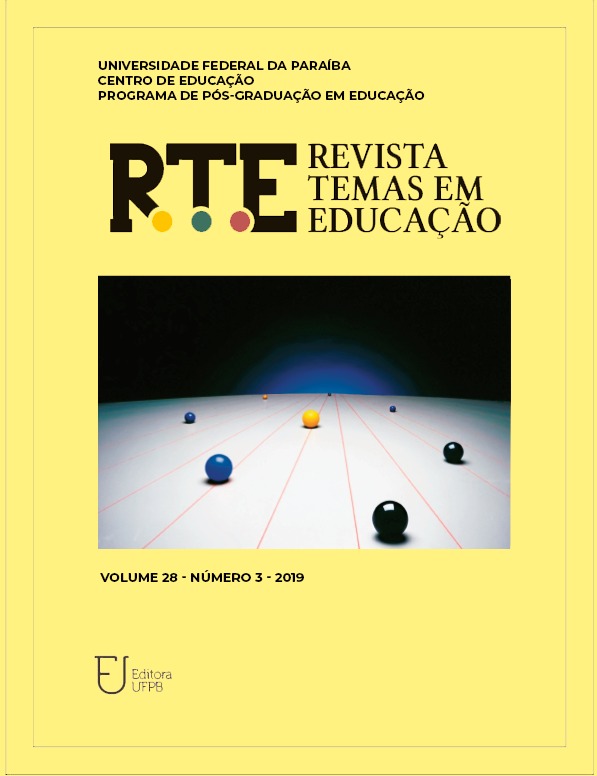THE USE OF DIGITAL INFORMATION AND COMMUNICATION TECHNOLOGIES IN TEACHING BODY PRACTICES IN THE TRAINING OF PHYSICAL EDUCATION TEACHERS - EXPERIENCES AT UFS
THE USE OF DIGITAL INFORMATION AND COMMUNICATION TECHNOLOGIES IN TEACHING BODY PRACTICES IN THE TRAINING OF PHYSICAL EDUCATION TEACHERS - EXPERIENCES AT UFS
DOI:
https://doi.org/10.22478/ufpb.2359-7003.2019v28n3.47728Keywords:
Digital information and communiction technologies, Body practices, Physical Education Teacher TrainingAbstract
One of the great challenges in the current educational field is to articulate the possibilities generated by the media and technologies in order to enhance the political and aesthetic processes of the school contents of a society in constant change. Initial - and continuous - education should provide the opportunity to face this challenge so that we have implications for the use of these technologies in the school context. This writing is an experience description that discusses the use of Digital Information and Communication Technologies (TDICs) to mediate the pedagogical didactic process of “corporal practices” with the formative process of Physical Education teachers at the Federal University of Sergipe (UFS). The text proposes to tell three experiences: (1) minute video, (2) tutorial for teaching athletics competitions and (3) cinema/audiovisual experiences in specific subjects. It can be concluded that, nowadays, there is a demand for the openness to what media education, as knowledge and pedagogical practice, offers to the educational and investigative field. The experiences reported here were elaborated in a sense to impact the pedagogical practices of these future teachers when acting later in school.
Downloads
References
BELLONI, Maria Luiza. O que é mídia-educação. Campinas: Autores Associados, 2001.
BELLONI, Maria Luiza. Mídia-educação: contextos, histórias e interrogações. In: FANTIN, Monica; RIVOLTELLA, Pier Cesare (Org.). Cultura digital e escola: pesquisa e formação de professores. Campinas: Papirus, 2012, p. 31-56.
BETTI, Mauro (Org.). Educação Física e mídia: novos olhares, outras práticas. São Paulo: Hucitec, 2003.
BETTI, Mauro. A janela de vidro: esporte, televisão e Educação Física. Campinas: Papirus, 1998.
BETTI, Mauro. Mídias: aliadas ou inimigas da Educação Física Escolar? Motriz, São Paulo, v. 7, n. 2, jul.-dez. 2001, p. 125-129.
BÉVORT, Evelyne; BELLONI, Maria Luiza. Mídia-educação: conceitos, história e perspectivas. Educação & Sociedade, Campinas, v. 30, n. 109, p. 1081-1102, set./dez. 2009. Disponível em: http://www.scielo.br/pdf/es/v30n109/v30n109a08.pdf. Acesso: 23 jan. 2017.
BRACHT, Valter. Educação Física e ciência: cenas de um casamento (in)feliz. 2ª. Ed. Ijuí: Unijuí, 1999.
BRASIL. Ministério da Educação. Secretaria de Educação Básica. Orientações Curriculares para o Ensino Médio. Brasília: MEC, 2006.
BRASIL. Ministério da Educação. Secretaria da Educação Básica. Base Nacional Comum Curricular. Brasília: MEC, 2017. Disponível em: http://basenacionalcomum.mec.gov.br/#/site/inicio. Acesso em: 30 jul. 2019.
CAMILO, Rodrigo Cordeiro; BETTI, Mauro. Multiplicação e convergência das mídias: desafios para a educação física escolar. Motrivivência, Florianópolis, ano XXII, n. 34, jun./2010, p. 122-135.
DANTAS JUNIOR, Hamilcar Silveira; ZOBOLI, Fabio; MEZZAROBA, Cristiano; SILVA, Renato Izidoro da. Cinema e formação de professores de Educação Física: relatos de experiência com seminários de cinema na Universidade Federal de Sergipe. Revista Cocar, Belém/PA, n. 5, 2019. Disponível em: https://paginas.uepa.br/seer/index.php/cocar/article/view/2349. Acesso:12 jul. 2019.
FANTIN, Monica; GIRARDELLO, Gilka (Org.). Liga, roda, clica: estudos em mídia, cultura e infância. Campinas: Papirus, 2008.
FANTIN, Monica. Mídia-educação no currículo e na formação inicial de professores. In: FANTIN, Monica; RIVOLTELLA, Pier Cesare (Org.). Cultura digital e escola: pesquisa e formação de professores. Campinas: Papirus, 2012, p. 57-92.
FANTIN, Monica; RIVOLTELLA, Pier Cesare. Cultura digital e formação de professores: usos da mídia, práticas culturais e desafios educativos. In: FANTIN, Monica; RIVOLTELLA, Pier Cesare (Org.). Cultura digital e escola: pesquisa e formação de professores. Campinas: Papirus, 2012, p. 95-146.
FISCHER, Rosa Maria Bueno. Imagens da mídia, educação e experiência. In: FANTIN, Monica; GIRARDELLO, Gilka (Org.). Liga, roda, clica: estudos em mídia, cultura e infância. Campinas: Papirus, 2008, p. 25-40.
FISCHER, Rosa Maria Bueno. “Mitologias” em torno da novidade tecnológica em educação. Educação & Sociedade, Campinas, v. 33, n. 121, out./dez. 2012. Disponível em: http://www.scielo.br/scielo.php?pid=S0101-73302012000400007&script=sci_arttext. Acesso: 15 ago. 2014.
LAZZAROTTI FILHO, Ari et al. O termo práticas corporais na literatura científica brasileira e sua repercussão no campo da Educação Física. Movimento, Porto Alegre, v. 16, n. 1, 2010, p. 11-29.
PIRES, Giovani De Lorenzi. Educação Física e o discurso midiático: abordagem crítico-emancipatória. Ijuí/RS: Editora da UNIJUÍ, 2002.
PORTO, Tania Maria Esperon. As tecnologias estão nas escolas. E agora, o que fazer com elas? In: FANTIN, Monica; RIVOLTELLA, Pier Cesare (Org.). Cultura digital e escola: pesquisa e formação de professores. Campinas: Papirus, 2012, p. 167-194.
RIVOLTELLA, Pier Cesar. Retrospectivas e tendências da pesquisa em mídia-educação no contexto internacional. In: FANTIN, Monica; RIVOLTELLA, Pier Cesare (Org.). Cultura digital e escola: pesquisa e formação de professores. Campinas: Papirus, 2012, p. 17-29.
SETTON, Maria da Graça. Mídia e educação. São Paulo: Contexto, 2010.
ZOBOLI, Fabio; MEZZAROBA, Cristiano. A estratégia do tutorial no ensinar-aprender esporte: relato de uma experiência com o atletismo. Cadernos de Formação RBCE, v. 8, n. 1, 2017. Disponível em: http://revista.cbce.org.br/index.php/cadernos/article/view/2254. Acesso: 12 jul. 2019.
Downloads
Published
How to Cite
Issue
Section
License
Authors who publish in this journal agree to the following terms:
. Authors retain the copyright and grant the journal the right to first publication, with the work simultaneously licensed under the Licença Creative Commons Attribution that allows the sharing of the work with acknowledgment of authorship and initial publication in this magazine. . Authors are authorized to assume additional contracts separately, for non-exclusive distribution of the version of the work published in this journal (eg, publishing in institutional repository or as a book chapter), with acknowledgment of authorship and initial publication in this journal.
. Authors are permitted and encouraged to publish and distribute their work online (eg in institutional repositories or on their personal page) at any point before or during the editorial process, as this can generate productive changes, as well as increase impact and citation of the published work (See O Efeito do Acesso Livre).



















